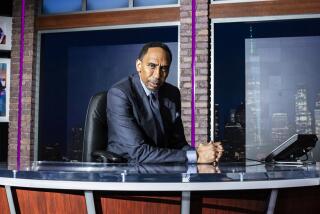Sharp Voice Strikes Right Chord in Radio Ads
- Share via
If you drove to work this morning, you probably heard Thom Sharp. And if you drive back home this evening, you’ll probably hear him again.
All you have to do is turn on your radio.
He’s the guy yacking on more radio spots these days than just about anyone. Remember that Nissan truck spot in which Sharp, a Sherman Oaks resident, tried to explain the difference between the reaction of a car owner and truck owner to someone leaning on their vehicle? “A car person would say, ‘Excuse me sir, you’re leaning on my truck,’ ” Sharp said in the radio ad. “A truck person would say, ‘Hey dog arms, get off my truck.’ ”
Why did Sharp, a former Detroit resident, record Nissan radio ads for nearly a year? “In Detroit, everyone on my block worked for Ford, so I always thought I’d stay away from foreign car spots,” Sharp said. “But the fact is, I’ve been doing these radio voice-overs for eight years now and Ford’s never called.”
Just about everyone else has.
Sharp is also the guy who keeps trying to get radio listeners to subscribe to the Herald Examiner. In one recent radio spot set at a health club, he says: “If at any time while you’re reading the Herald, you become short of breath or dizzy, don’t worry. It probably just means your bicycle pants are locking up on you.”
And yes, he’s also the fellow pitching that Tallon termite control which, he says in the radio ads, works by “freezing their little buns off.” And nationwide, his radio ads in different regions pitch everything from a bank in Washington to the Minnesota North Stars hockey team.
Now, Daihatsu is using Sharp’s voice-overs in TV commercials airing nationwide. In one tongue-in-cheek ad, a Daihatsu owner walks into his garage late at night to “feed” his Daihatsu a slab of beef. Sharp--who is heard but not seen in the commercial--explains that this is how owners of the Daihatsu Charade can appease the car’s “ferocious” new 16-valve engine.
At a time advertisers everywhere are looking for a way to cut through the clutter, many are just discovering that the 41-year-old Sharp’s neighborly radio voice may be a far more effective attention grabber than that of a high-priced celebrity.
“Tom has created a space that wasn’t there before,” said Lorenzo Music, who is generally recognized as one of the top names in radio advertising. “He doesn’t sound like an actor or an announcer. He’s himself,” said Music, who has recorded ads for everyone from McDonald’s to the Queen Mary.
There are so many sound-alike voices in radio these days that it’s difficult to stand out at all, said Hal Riney, the San Francisco adman who may be best recognized for his warm, commercial voice-overs on Gallo wine spots. “There just aren’t many good voices out there,” said Riney, who admitted that he’s never heard of Sharp.
He will. Many advertising experts say Sharp’s voice could eventually place him among the elite of radio broadcast advertising. “When you hire Tom, you’re not just hiring his voice, you’re hiring his mind, as well,” said David Prince, senior radio producer at the Venice ad firm Chiat/Day, which picked Sharp as the radio spokesman for its biggest client, Nissan. “Some of our best bits are his ad-libs.”
Indeed, the one line in the Herald Examiner commercial about the “bicycle pants locking up on you,” was one of Sharp’s ad-libs. “He can sell you stuff, and you’re not offended by the fact that he’s selling it to you,” said Scott Aal, a copywriter at Ketchum Advertising/Los Angeles.
Of course, Sharp’s ad-libs can also spell trouble at some agencies. “Sure, the ad-libs almost always add something good to the copy,” said Marvin Himelfarb, president of the Hot Spots, the Hollywood production company that has used Sharp in a number of ads. “But ad-libs can also drive clients up a wall. Remember, every time you make a change in the script, you need the client’s approval.”
Perhaps one reason Sharp likes to ad-lib so much in commercials is that he was once a copywriter himself. In fact, he worked for several Detroit ad firms, including one of the biggest in the Motor City, W. B. Doner.
Then, 12 years ago, Sharp moved with his wife, Judy, to Los Angeles. He started doing stand-up comedy at the Ice House in Pasadena and within a few years was doing those same skits on the Tonight Show and the Merv Griffin Show.
But unlike radio, television has not been very good to Sharp. Every major network has canceled a series that Sharp has appeared in, including ABC’s “Half-Hour Comedy Hour,” where he was a co-host; NBC’s “Sweet Surrender,” where he played a sports medicine doctor, and CBS’s “First Impressions,” where he played an adman.
“I didn’t last very long,” Sharp said, “but the odds of getting on TV, getting your own show and staying on the air are probably one in six trillion.”
Now, however, Sharp is trying again. But this time he’s just trying to sell his voice--not his face. Last Friday he auditioned for the part of a talking lizard--”Larry Lizard” to be precise--in an NBC pilot for an animated TV series.
Television, after all, is where the money is. Whereas Sharp pulls in about $300 for each radio spot he does, he could make many times that as a television spokesman. And any TV series that clicks, of course, would offer the biggest payday of all. But, insists Sharp, “I’d rather be in a good commercial than in a lousy TV series.”
Because his radio voice has been so heavily exposed in the Los Angeles market, he has even turned down some offers. Last year, the San Bernardino mountain ski resort Bear Mountain asked him to do a series of radio spots. But his Nissan radio ads were already blanketing the airwaves. “There’s a risk in doing too many things in one market,” Sharp said. “No one wants to hear wall-to-wall me.”
Then, again, maybe they do. His agent says she gets four to five calls daily from advertisers who want Sharp. “He rarely has a day off,” said Rita Vennari, co-owner of the Los Angeles commercial talent agency, Sutton, Barth & Vennari. “But sometimes you get scared when someone says to you, ‘I hear him all the time.’ ”
Not to worry, said Rich Kapnick, a Hollywood media marketing consultant, who specializes in broadcast advertising. “His kind of personality is so warm and affable,” Kapnick said, “that the more you hear him, the more you like him.”
Certainly, financial institutions like Sharp. He’s recently done ads for five of them in four states. But Sharp refuses to do any political ads, “unless McGovern decides to run again for President,” he said.
The one ad he most regrets doing was a TV commercial a few years ago for Kellogg’s Nutra Grain cereal, where the balding Sharp was persuaded to wear a toupee. Said Sharp: “I looked like I was wearing a member of the animal kingdom on my head.”
Although his voice is his glory, Sharp doesn’t like to hear it on the air. “Sometimes I think I sound too gooney,” he said. Recently, however, while sitting in his dentist’s chair, he heard one of his Herald Examiner ads piped into the office.
“I was getting a crown put in, so I couldn’t talk,” Sharp said, “but I started to move around in the chair.” Thinking that something was wrong, the dentist stopped drilling--then heard the commercial that featured the patient’s voice.
How impressed was the dentist? He resumed his drilling.
Banks Certainly Don’t Find This Ad Beneficial
Not many firms would take much comfort in being linked in TV commercials with Libyan leader Col. Moammar Kadafi, former Philippines President Ferdinand E. Marcos or Panama’s military strongman, Gen. Manuel A. Noriega.
Especially not American banks.
But a biting ad campaign for Beneficial Corp., the Wilmington, Del.-based finance company, says that while banks have loaned billions of dollars to these corrupt, foreign leaders, Beneficial would rather loan money to American families.
The ad begins with a picture of a smiling Kadafi. A voice-over says, “Over the years, U.S. banks have loaned $20 million to people like this.” Next a picture of Marcos and the voice says, “$5.7 billion to people like this.” And then a photo of Noriega, “$3 billion to people like this.” The ad ends with a shot of a happy family, as a father hoists his young daughter into the air. “But for 75 years, we’ve always believed it was more important to lend money to people like this. Beneficial. We’re not a bank, so we don’t have to act like one.”
The ad, which last week won the top prize at the 25th Andy Awards presented by the Advertising Club of New York, was created by the New York ad firm Levine, Huntley, Schmidt & Beaver. “It may not make everybody happy,” said its chairman, Robert Schmidt, “but it talks to the people we’re trying to talk to.”
The ad surely hasn’t won any prizes in banking circles; several have mailed or telephoned complaints to Beneficial. And the Washington-based American Bankers Assn. recently mailed a letter of protest to the Federal Trade Commission, requesting that the ad be pulled. “The ad is a blatant misrepresentation,” said Allan Paro, director of advertising for the ABA. “The banks didn’t loan the money to dictators. They loaned it to their countries. I can’t imagine anyone who would give $5 million to Marcos. How would you explain that to your board of directors?”






